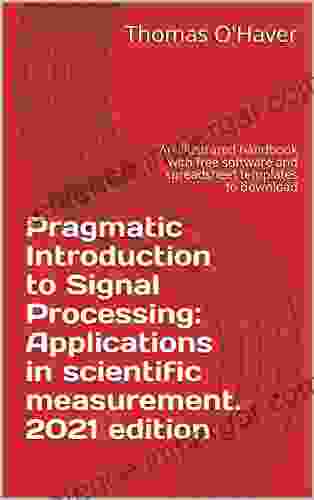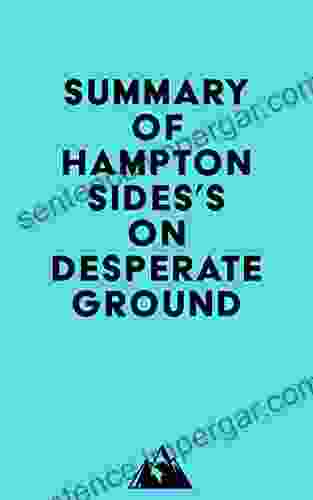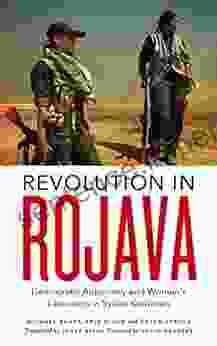Democratic Autonomy and Women's Liberation in Syrian Kurdistan: A Revolutionary Model for the Middle East and Beyond

In the midst of the ongoing conflict in Syria, a remarkable experiment in self-governance is taking place in the Kurdish-majority region of Rojava in the north of the country. Since 2012, the people of Rojava have been building a society based on principles of democratic autonomy, women's liberation, and ecological sustainability.
4.8 out of 5
| Language | : | English |
| File size | : | 5994 KB |
| Text-to-Speech | : | Enabled |
| Enhanced typesetting | : | Enabled |
| Print length | : | 272 pages |
| Screen Reader | : | Supported |
At the heart of this revolution is the idea that women's liberation is essential for the creation of a truly democratic and just society. Women in Rojava have taken on leadership roles in all spheres of life, from politics and economics to education and healthcare. They have also established their own armed forces, the Women's Protection Units (YPJ),to defend their revolution from both internal and external threats.
The Rojava revolution is a beacon of hope for women in the Middle East and beyond. It shows that a different world is possible, a world in which women are free and equal, and in which democracy and justice prevail.
The History of Women's Liberation in Rojava
The roots of women's liberation in Rojava can be traced back to the Kurdistan Workers' Party (PKK),a Kurdish nationalist organization founded in 1978. The PKK has long been committed to gender equality, and its ideology has had a profound impact on the way that women have organized and struggled for their rights in Rojava.
In 2003, the PKK launched a campaign for "democratic autonomy" in Rojava. This campaign called for the creation of a self-governing region in which the people of Rojava would have the right to determine their own future. The campaign was met with fierce resistance from the Syrian government, but the people of Rojava were determined to achieve their goals.
In 2012, the Syrian government withdrew its forces from Rojava, and the people of the region declared their independence. The new autonomous region was named Rojava, and it quickly became a haven for refugees from other parts of Syria.
One of the first things that the people of Rojava did was to establish a new constitution that enshrined the principles of democratic autonomy and women's liberation. The constitution guarantees equal rights for women and men, and it also establishes quotas for women in all levels of government.
Since the adoption of the constitution, women in Rojava have made significant progress in achieving their goals. They have taken on leadership roles in all spheres of life, and they have also established their own armed forces, the Women's Protection Units (YPJ).
The YPJ has played a vital role in defending Rojava from both internal and external threats. The YPJ has fought against the Islamic State of Iraq and Syria (ISIS),and it has also played a key role in the defense of Kobani, a city in Rojava that was besieged by ISIS for over four months in 2014.
The YPJ is a symbol of the women's revolution in Rojava. It shows that women are not only capable of fighting for their rights, but they are also capable of leading and defending their communities.
The Principles of Democratic Autonomy
The principles of democratic autonomy are based on the idea that people should have the right to govern themselves and to determine their own future. In Rojava, democratic autonomy is implemented through a system of local councils that are elected by the people.
The local councils are responsible for making decisions about all aspects of life in their communities, including education, healthcare, and economic development. The councils are also responsible for ensuring that the principles of democratic autonomy are upheld.
The system of democratic autonomy in Rojava is still in its early stages of development, but it has already had a profound impact on the lives of the people of the region. The local councils have given people a greater say in how their communities are run, and they have also helped to improve the quality of life for all residents.
The principles of democratic autonomy are a model for other regions of the world that are struggling to achieve peace and justice. They show that it is possible to build a society based on the principles of democracy, equality, and sustainability.
The Impact of the Rojava Revolution on Women
The Rojava revolution has had a profound impact on the lives of women in the region. Women in Rojava have achieved unprecedented levels of freedom and equality, and they are playing a vital role in all spheres of life.
The Rojava revolution has shown that it is possible to create a society in which women are free and equal. It is a model for other regions of the world that are struggling to achieve gender equality.
The Rojava revolution is a beacon of hope for women in the Middle East and beyond. It shows that a different world is possible, a world in which women are free and equal, and in which democracy and justice prevail.
The principles of democratic autonomy and women's liberation that are being implemented in Rojava are a model for other regions of the world that are struggling to achieve peace and justice. They show that it is possible to build a society based on the principles of democracy, equality, and sustainability.
The Rojava revolution is an inspiration to all those who believe in a better world. It is a reminder that change is possible, and that we must never give up on our dreams of a more just and equitable society.
4.8 out of 5
| Language | : | English |
| File size | : | 5994 KB |
| Text-to-Speech | : | Enabled |
| Enhanced typesetting | : | Enabled |
| Print length | : | 272 pages |
| Screen Reader | : | Supported |
Do you want to contribute by writing guest posts on this blog?
Please contact us and send us a resume of previous articles that you have written.
 Book
Book Novel
Novel Page
Page Chapter
Chapter Text
Text Story
Story Genre
Genre Reader
Reader Library
Library Paperback
Paperback E-book
E-book Magazine
Magazine Newspaper
Newspaper Paragraph
Paragraph Sentence
Sentence Bookmark
Bookmark Shelf
Shelf Glossary
Glossary Bibliography
Bibliography Foreword
Foreword Preface
Preface Synopsis
Synopsis Annotation
Annotation Footnote
Footnote Manuscript
Manuscript Scroll
Scroll Codex
Codex Tome
Tome Bestseller
Bestseller Classics
Classics Library card
Library card Narrative
Narrative Biography
Biography Autobiography
Autobiography Memoir
Memoir Reference
Reference Encyclopedia
Encyclopedia Jeff Deck
Jeff Deck Jeannie Henderson
Jeannie Henderson Jeanne Safer
Jeanne Safer James E Brumbaugh
James E Brumbaugh Jane King
Jane King Jang Kyo Kim
Jang Kyo Kim James Rojas
James Rojas James D Reid
James D Reid James P Byrd
James P Byrd James Desborough
James Desborough Jason Hes
Jason Hes Janice M Roper
Janice M Roper Javier De Prada Pareja
Javier De Prada Pareja Jane Mcgregor
Jane Mcgregor James R Gillespie
James R Gillespie Janet I Beik
Janet I Beik James Li
James Li James O Dea
James O Dea James W Heisig
James W Heisig James Kraska
James Kraska
Light bulbAdvertise smarter! Our strategic ad space ensures maximum exposure. Reserve your spot today!

 Hunter MitchellApplications In Scientific Measurement 2024 Edition: Your Key to Unlocking...
Hunter MitchellApplications In Scientific Measurement 2024 Edition: Your Key to Unlocking... Melvin BlairFollow ·15.7k
Melvin BlairFollow ·15.7k Hunter MitchellFollow ·10.5k
Hunter MitchellFollow ·10.5k Derrick HughesFollow ·6.9k
Derrick HughesFollow ·6.9k Vincent MitchellFollow ·9.2k
Vincent MitchellFollow ·9.2k Cormac McCarthyFollow ·9.3k
Cormac McCarthyFollow ·9.3k Darren BlairFollow ·10.3k
Darren BlairFollow ·10.3k Peter CarterFollow ·13.4k
Peter CarterFollow ·13.4k Ken FollettFollow ·19.6k
Ken FollettFollow ·19.6k

 Jacob Foster
Jacob FosterPrinciples and Persons: The Legacy of Derek Parfit
Derek Parfit's 1984 book,...

 Leo Mitchell
Leo MitchellPartners For Life: Raise Support For Your Missionary Work...
Are you a missionary or ministry leader...

 Blake Kennedy
Blake KennedyOn Desperate Ground: A Gripping Account of World War II's...
Hampton Sides' "On...

 Duane Kelly
Duane KellyCriminal Minds Sociopaths Serial Killers And Other...
In the realm of criminology,...

 Craig Blair
Craig BlairHome Repair: The Ultimate Guide to Fix, Maintain, and...
Welcome to the...

 Elmer Powell
Elmer PowellThe Organic Grower Guide to Mycorrhizae Science for...
Unlock the Secrets of Soil...
4.8 out of 5
| Language | : | English |
| File size | : | 5994 KB |
| Text-to-Speech | : | Enabled |
| Enhanced typesetting | : | Enabled |
| Print length | : | 272 pages |
| Screen Reader | : | Supported |










